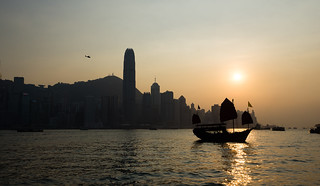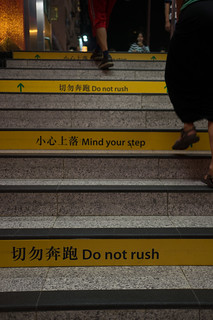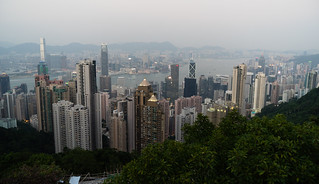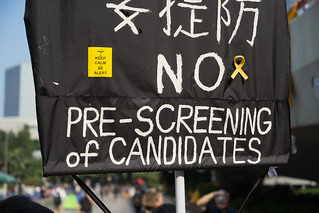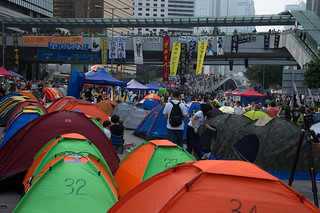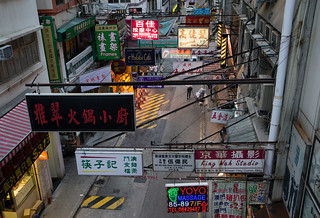“How did you get to Hong Kong so quickly?” a friend wrote me via gchat. We had just been in the dead center of China, and then suddenly we were posting pictures from Hong Kong, more than a thousand miles away.
China gave us a one year, multiple entry visa, but gave us only 30 days at a time to stay in the country. We had originally hoped to make it most of the way across the country (by both train and bike) and cross into Mongolia and back at the end of our first 30 days in China. Unfortunately, due to various delays, we found ourselves in Lanzhou, what Lonely Planet calls “The geographic heart of China.”
After weighing a few options (including hearing that the Public Security Bureau office in Lanzhou — the office that extends visas — is a pain in the ass), we decided to fly to Hong Kong. Hong Kong, although officially part of China, has completely different visa requirements, and it “counts” as leaving China for visa-renewal purposes. All we had to do was cross the border and return.
So we did something we haven’t done in six months: got on a plane. Our host in Lanzhou, a Peace Corps volunteer, generously agreed to store our bikes and most of our stuff, and we took a flight.
Hong Kong. It is a place I’ve never thought much about, but I knew that it was a wealthy city in Asia that had once been part of the British Empire, and then was somehow handed over to China at the end of the 20th century.
Hong Kong is under a different “system” than mainland China — The Chinese government refers to Hong Kong and China as “One Country, Two Systems.” The city enjoys western style judiciary, rule of law, freedom of speech, and limited democracy (half of the legislature is elected directly by the population, the other half of the legislature is elected through a complicated system I don’t quite understand, and the executive is appointed by a committee whose members appear to be chosen by Beijing). While Mao was destroying China’s economy and starving its people, Hong Kong, under the British, developed into a wealthy city that grew as refugees fled mainland China.
We enjoyed some retail therapy in the city: we got new bike touring gear for Lindsey (Brooks saddle, Ortlieb handlebar bag), and I obtained a new camera lens — there was almost no way we’d find such items in Central Asia (or western China). Also, my camera had been malfunctioning, and we were able to find an *amazing* camera repairman who fixed both the audio input and one of the camera’s dials. As an environmentalist, I know I’m supposed to bemoan the capitalistic waste of a finance center like Hong Kong. Instead, we spent most of our time feeling incredibly thankful to be in a modern city. It was fantastic. We had at least one latte a day.
It was great to be able to buy things that we wanted to buy, and to be somewhere that was clean, where cars didn’t honk loudly, where people didn’t smoke in restaurants, and where bathrooms have toilet paper. People don’t spit or yell, and when they eat their soup with chopsticks and a spoon, they don’t slurp loudly. The subway was quiet, fast, and relatively cheap. We found a few neighborhoods that reminded us of the culinary diversity of San Francisco, but were much cleaner. And everyone spoke at least some English. When we wanted to find out where something was, we just asked somebody. It was great.
(A side note on honking. Central China is the worst place I have ever been for people over-using their horns. Almost every car that passed us honked several times before doing so. They also honk when they drive around corners, or when they enter a populated area. Small roads wind through the countryside, and then pass through small villages. When cars get to these villages, instead of slowing down, they just honk loudly, we guess because they want to prevent any villagers from wandering into the streets. The horns seem louder than in other countries we’ve been in — or maybe they are just leaning on them harder — and big trucks are the biggest decibel offenders. The result is that if you live along the road, even in a small town, you hear honking all day long. I have a theory that people slurp their soup so much in China because they are all deaf from the honking.)
We stayed with a warmshowers.org host — Phil, from the UK — and continue to be thankful for the generosity of people in this network. We were unfortunately able to spend very little time with Phil, but he nonetheless provided for us numerous maps of the city and daily (very helpful) advice on where to go. We aspire to be such good hosts when we return to California.
After our much-needed retail therapy, we met with a number of people working on climate change and environmental issues in the city. We met with a Sam Inglis, a young man who organized Hong Kong’s contribution to the People’s Climate March, Merrin Pearse, a sustainability consultant who has worked for several NGOs in the city, and Ciara Shannon, an expert who works on several sustainability and climate projects, especially with businesses. And somewhat related, I was able to speak with young people taking part in the street protests agains the government, and one of the girls I spoke with had worked previously with Greenpeace.
Hong Kong occupies a unique place in the world — as part of China, it doesn’t send its own delegation to the international climate meetings, but it also doesn’t necessarily follow the policies of Beijing. The sentiment I got from our conversations was that the city is mostly focused on finance and business. Some international NGOs look at the city largely as a fundraising base — not as a place for action. Also, as it is not a “full democracy,” it is difficult to pressure the government into action. One of the former Greenpeace volunteers told me that environmental groups had tried to pressure the city’s utilities into reducing emissions, with very limited success (there is an effective duopoly, and the utilities didn’t have much incentive).
There is some hope — Ciara Shannon talked about her work on the Business Environmental Council, and how a number of businesses in Hong Kong with serious clout, such as the bank HSBC, are working to make a difference on climate change. The city also has a sustainability plan, although it may be limited in scope.
I asked what people thought about climate change. “Environmentalism here is about recycling,” I was told. There is lots of waste, and there is little space on the island, so people worry first about this challenge. Another person told us that “Half of the people in Hong Kong live on the 14th floor or higher,” and explained how it is hard to develop a connection with nature in that environment. When people think about climate change, “they think about polar bears,” and not the strong typhoons that occasionally hit the city.
Ultimately, though, the response to climate change must be significantly government-led, and this is challenging when your government isn’t a full democracy. This is a question I’ve been asking myself ever since we left Georgia (the last democratic nation we visited): what do you do when you can’t vote? In the U.S., to help solve climate change, we tell people to vote or put pressure on our elected leaders. In mainland China, and to a lesser extent Hong Kong, you can’t get change that way.
I was honestly quite surprised when I learned that people in Hong Kong couldn’t elect their leaders. I expect wealthy, first world cities to have modern, democratic governments. I have been fascinated by the protests in Hong Kong. In the few weeks before we arrived in the city, tens and hundreds of thousands of Hong Kongers filled the streets to demand a more representative government. The Beijing government, though, is *extremely* unlikely to give the protestors their demands, partially because Beijing wants to retain control over Hong Kong’s chief executive, and partially because Beijing doesn’t want people in China to think that street protests can lead to change.
When we were in the city, the protests had dwindled, but there were still many young people, with umbrellas and tents, occupying the streets. We sat and talked with one student about why the students were protesting.
Later, I spoke with another student at length about the protests. She gave me a long history of the movement, including how protests had worked two years earlier to stop the government from implementing pro-Beijing curriculum in schools. She also explained how the protests were also driven by the frustration of the younger generation, who “can’t buy apartments unless we work in finance.”
It’s inspiring to see people fighting for basic democratic rights. I’m reminded that the values I have about freedom and democracy aren’t necessarily shared by all people of the world. That said, I still believe that democracy is the only truly acceptable form of government, and that these students, in the streets, are on the right side of history. There has been a lot of talk over whether they have been successful or not — but at getting attention, and bringing democracy into the public conversation in Hong Kong, they have been unbelievably successful. I only hope that this can translate into change sooner rather than later.
On our last day in Hong Kong, we were invited to speak on a radio show, Morning Brew. Our host, Sam or Phil something, asked us questions about our trip and what we had learned about climate change in Asia. You can listen to it here.
Afterwards, we returned to the airport and boarded a plane bound for the center of China, where our bikes awaited. Lindsey calculated that the round trip flight would result in us adding about 1.4 tons of carbon dioxide to the atmosphere. That is a lot of carbon — the average human is responsible for around five tons per year — and there is a reason this isn’t “Fly for Climate.” We are buying offsets for this trip, which cost less than $20.







